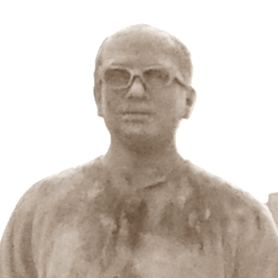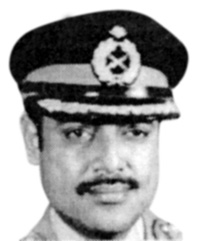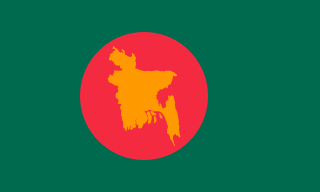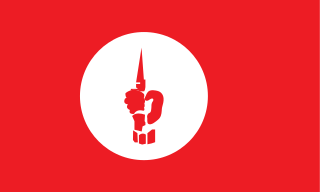Related Research Articles

Sheikh Mujibur Rahman, often shortened as Sheikh Mujib or Mujib, also widely known as Bangabandhu, was the founder of Bangladesh. He first served as the titular president of the Provisional Government of Bangladesh between April 1971 and January 1972. He then served as Prime Minister of Bangladesh from the Awami League between January 1972 and January 1975. He finally served as President again during BAKSAL from January 1975 till his assassination in August 1975. In 2011, the 15th constitutional amendment in Bangladesh referred to Sheikh Mujib as the Father of the Nation who declared independence; these references were enshrined in the fifth, sixth, and seventh schedules of the constitution.

The Bangladesh Liberation War was a revolution and armed conflict sparked by the rise of the Bengali nationalist and self-determination movement in East Pakistan, which resulted in the independence of Bangladesh. The war began when the Pakistani military junta based in West Pakistan—under the orders of Yahya Khan—launched Operation Searchlight against the people of East Pakistan on the night of 25 March 1971, initiating the Bangladesh genocide.

Syed Nazrul Islam was a Bangladeshi politician and a senior leader of the Awami League. During the Bangladesh Liberation War, he was declared as the Vice President of Bangladesh by the Provisional Government. He served as the Acting President in the absence of Sheikh Mujibur Rahman.

Tajuddin Ahmad was a Bangladeshi politician and statesman. He led the Provisional Government of Bangladesh as its prime minister during the Bangladesh Liberation War in 1971 and is regarded as one of the most instrumental figures in the birth of Bangladesh.
Shah Azizur Rahman was a Bangladeshi politician who served as the Prime Minister of Bangladesh. However, he was the subject of considerable controversy for his collaboration with the Pakistan Army against the struggle to Independence of Bangladesh.
Muhammad Ataul Goni Osmani, was a Bengali military leader. Osmani's career spanned five decades, beginning with service in the British Indian Army in 1939. He fought in the Burma Campaign during World War II. After the partition of India in 1947, he joined the Pakistan Army and served in the East Bengal Regiment, retiring as a colonel in 1967. Osmani joined the Provisional Government of Bangladesh in 1971 as the commander-in-chief of the nascent Bangladesh Forces. Regarded as the founder of the Bangladesh Armed Forces, Osmani retired as a four-star general from the Bangladesh Army in 1972.

Khaled Mosharraf, Bir Uttom was a Bangladeshi military officer known for his role in the Bangladesh Liberation War. Khaled was the Sector Commander of Bangladesh Forces Sector 2, leader of the Crack Platoon and K Force (Bangladesh) Brigade Commander during the Bangladesh War of Independence. He fought heroically for Bangladesh's independence and was wounded in front line combat against the Pakistan Army. Under his command K-Force played a crucial role in the unconditional surrender of the Pakistani Army on 16 December 1971. On 23 October, while commanding an operation of the K-Force, Khaled Mosharraf was gravely wounded by enemy fire and required a long period of recovery. Although he suffered a bullet injury, he recovered and remained in command of Bangladesh Forces Sector 2. He is best known as an exceptional combatant who had planned and carried out guerrilla warfare from deep within the jungles of Melaghar. More than thirty five thousand guerilla fighters fought under Khaled's command in sector 2.

Abdul Kader Siddique is a Bangladeshi politician. He served as a Mukti Bahini member and organizer of the Bangladesh Liberation War. He fought with an estimated 17,000-strong guerrilla force in the Tangail region against the Pakistan Army. The army was called Kaderia Bahini. At the end of the war, in1971, Siddique's forces entered Dhaka along with the Indian forces, signaling the end of the war. He was awarded Bir Uttom by the Government of Bangladesh. Since 1999, he has been serving as the leader of his newly formed party, the Krishak Sramik Janata League.

The Liberation War Museum is a museum at Agargaon in Dhaka, the capital of Bangladesh, which commemorates the Bangladesh Liberation War that led to the independence of Bangladesh from Pakistan.
The Agartala Conspiracy Case was a sedition case in Pakistan during the rule of Ayub Khan against Awami League, brought by the government of Pakistan in 1968 against Sheikh Mujibur Rahman, the then leader of the Awami League and East Pakistan, and 34 other people.

The first president of Bangladesh, Sheikh Mujibur Rahman, and most of his family were killed during the early hours of 15 August 1975 by a group of young Bangladesh Army personnel who invaded his Dhanmondi 32 residence as part of a coup d'état. Minister of Commerce Khondaker Mostaq Ahmad immediately took control of the government and proclaimed himself president. The assassination marked the first direct military intervention in Bangladesh's civilian administration-centric politics. 15 August is National Mourning Day, an official national holiday in Bangladesh.
The Bangladesh Liberation War started on 26 March 1971 and ended on 16 December 1971. Some of the major events of the war are listed in the timeline below.
Sheikh Fazlul Haque Moni was a Bangladeshi politician. He was one of the nephews of Bangabandhu Sheikh Mujibur Rahman the founding father of Bangladesh. He was the founder of Mujib Bahini Bangladesh Liberation Force-BLF one of the major guerrilla forces of the Bangladesh Liberation War and also the founder of Bangladesh Awami Jubo League, the youth wing of Bangladesh Awami League.
The Mujib Bahini, also known as Bangladesh Liberation Force (BLF), was an armed force formed during the Bangladesh Liberation War to fight against Pakistan in 1971. The force was mainly composed of activists drawn from the Awami League and its student front, the Chhatra League. At its height, it had reportedly 13,000 members. It was organised with the active assistance of Major General Sujan Singh Uban of the Indian Army. Serajul Alam Khan and Sheikh Fazlul Haque Mani, Tofael Ahmed and Abdur Razzaq, MP were the organizers of this force.

The Independence Day of Bangladesh is celebrated on 26 March as a national holiday in Bangladesh. It commemorates the country's declaration of independence from Pakistan in the early hours of 25 March 1971.

The independence of Bangladesh was declared on 26 March 1971 at the onset of the Bangladesh Liberation War by Bangabandhu Sheikh Mujibur Rahman; the following day the declaration was broadcast by Major Ziaur Rahman in a radio broadcast. On 10 April, the Provisional Government of Bangladesh issued a proclamation on the basis of the previous declaration and established an interim constitution for the independence movement.

The 7 March Speech of Bangabandhu was a public speech given by Sheikh Mujibur Rahman, the Founding Father of Bangladesh on 7 March 1971 at the Ramna Race Course in Dhaka to a gathering of over two million (2,000,000) people. It was delivered during a period of escalating tensions between East Pakistan and the powerful political and military establishment of West Pakistan. In the speech, Bangabandhu informally declared the independence of Bangladesh, proclaiming: "The struggle this time, is a struggle for our liberty. The struggle this time, is a struggle for our independence." He announced a civil disobedience movement in the province, calling for "every house to turn into a fortress".

The Provisional Government of Bangladesh, popularly known as the Mujibnagar Government, was established following the declaration of independence of East Pakistan as Bangladesh on 10 April 1971. Headed by prime minister Tajuddin Ahmad, it was the supreme leadership of the Bangladeshi liberation movement, comprising a cabinet, a diplomatic corps, an assembly, an armed force, and a radio service.

The Mukti Bahini, also known as the Bangladesh Forces, was the guerrilla resistance movement consisting of the Bangladeshi military, paramilitary and civilians during the Bangladesh Liberation War that transformed East Pakistan into Bangladesh in 1971. They were initially called the Mukti Fauj.

Muktijoddha Sangsad a non-political welfare association of the combatants during the Bangladesh Liberation War formed on 13 February 1972. The organisation has a football club, Muktijoddha Sangsad KC, named after itself.
References
- ↑ "Anatomy of Violence: Analysis of Civil War in East Pakistan in 1971 – Natun Dhaka Digest". dhakadigest.net. Retrieved 2 February 2018.
- ↑ Swami, Praveen (26 December 2011). "India's secret war in Bangladesh". The Hindu. ISSN 0971-751X . Retrieved 2 February 2018.
- ↑ Richard, Rose, Richard, Leo E. (1991). War and Secession: Pakistan, India, and the Creation of Bangladesh. University of California Press. ISBN 978-0520076655.
- ↑ "'Mujib Bahini didn't fight liberation war'". New Age. 16 December 2014. Retrieved 2 February 2018.
- ↑ Aziz, Qutubuddin (1974). "Blood & Tears" (PDF). storyofbangladesh.com. Retrieved 8 April 2013.
- ↑ "1971: Genocide of the Non Bengalis by the Indians and the Awami League". Pakistan: Politically Unpolitical. 30 December 2014. Retrieved 2 February 2018.
- ↑ Bose, Sarmila. "Myth-busting the Bangladesh war of 1971". www.aljazeera.com. Retrieved 2 February 2018.
- ↑ "'Agartala conspiracy case was not false'". bdnews24.com. Retrieved 2 February 2018.
- ↑ "1971 India Pakistan War: Role of Russia, China, America and Britain". www.theworldreporter.com. 30 October 2011. Retrieved 2 February 2018.
- ↑ "Israel helped India in 1971 war, reveals book". Hindustan Times. 1 November 2013. Retrieved 2 February 2018.
- ↑ "Israel secretly provided arms to India in 1971: Book - Times of India". The Times of India. Retrieved 2 February 2018.
- ↑ "Truth lost? Most military records of Bangladesh war missing - Times of India". The Times of India. Retrieved 2 February 2018.
- ↑ "'Files would have revealed Army's role' - Times of India". The Times of India. Retrieved 2 February 2018.
- ↑ "Text of PM's address at Bangabandhu Convention Centre". www.narendramodi.in. Retrieved 2 February 2018.
- ↑ "Indian forces fought along Mukti Bahini: Modi". www.thenews.com.pk. Retrieved 2 February 2018.
- ↑ "We are near and we are together: PM speaks at Dhaka University". www.narendramodi.in. Retrieved 2 February 2018.
- ↑ Saleem, Farrukh (14 March 2016). "Mukti Bahini, the forgotten terrorists". TheNews. Retrieved 2 February 2018.
- ↑ "AK Khandker sued for 'Mujib Bahini's looting' claim". 10 September 2014.
- ↑ Zehra, Batool (26 February 2012). "The other side of history". The Express Tribune. Retrieved 2 February 2018.